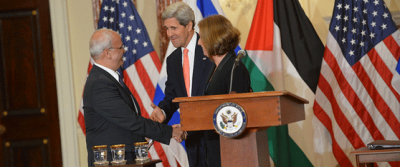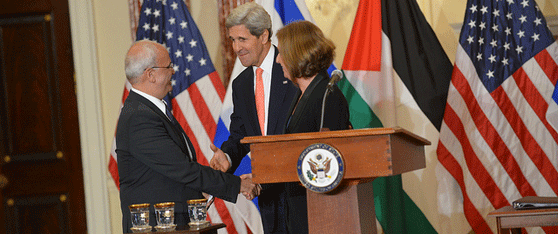
Just a few weeks ago, the White House released a video of President Obama wishing the American Jewish community a sweet New Year. Obama emphasized the importance of the newly-resumed peace talks between Israelis and Palestinians, as well as the responsibility of American Jews to act to bring an end to the Israeli-Palestinian conflict.
Now is the time to consider the significance of the current peace negotiations and to ask ourselves: what do we want the year 5774 to bring? Indeed, we have a historic opportunity before us: direct peace talks between Israelis and Palestinians have resumed for the first time in five years. But unfortunately, many American Jewish leaders are choosing to stand by in silence and let this opportunity slip away.
At this time of year, rabbis have a particularly potent ability to influence the discussion on the conflict in the American Jewish community. But many Jewish leaders would rather not talk about the conflict in an honest way. They prefer to declare their unconditional love of Israel and stop the conversation there, avoiding making any statements that might upset their more conservative congregants.
I first encountered this phenomenon on a month-long trip to Israel with NFTY, the North American Federation of Temple Youth. Save for two occasions, we failed to discuss the conflict, even when passing through the West Bank on our tour bus. One of my most salient memories from the trip is of a heated debate my group had about the conflict at a kibbutz a few miles from Gaza. Our only framing for the conversation was a visit to bomb shelters on the kibbutz. Though sometimes my counselors alluded to human rights issues, I didn’t feel that they made a sincere effort to help us understand the Palestinian narrative.
The discussion we had was completely dominated by a few of my most conservative peers, and to my dismay, practically everyone else failed to say anything at all. One of the most shocking moments in that conversation was when my counselors raised the question as to whether Israel should conduct a blockade on Gaza to prevent weapons transfers even if it meant cutting off citizens from food. In response, one girl said, “The Arabs are all terrorists. We should try to starve them!”
My peers seemed unfazed, and I couldn’t help but feel like I was the only one in shock. Why did my counselors and peers turn a blind eye to such blatant racism?
Perhaps because they didn’t want to challenge the hawks who dominated the conversation, in fear of being perceived as terrorist-defenders. Perhaps they were simply too afraid to confront their own values and apply them to Israel, apparently sometimes off-limits to the Jewish values we’d been learning about on the trip.
But ignorance is no excuse for refusing to act on Jewish values.
As we enter into 5774, let’s stop ignoring the conflict and instead look it squarely in the face. Let’s think about our future and consider what we want Israel to look like ten, twenty years down the line. Do we want Fatah to shift rightward or to see Hamas take over the West Bank? Do we value Israel’s claim on 100% of its land more than its Jewish and democratic nature? Do we want to reach a day when a Jewish minority rules over a non-Jewish minority with unequal rights to citizenship?
If our community answers no to these questions, we have only one option: the two-state solution, which preserves Israel’s Jewish and democratic character while establishing a peaceful Palestinian state next door. But supporting two states necessitates stronger voices from our leaders, particularly our Rabbis. On Rosh Hashanah, President Obama called nearly 1,000 rabbis to deliver this message. Rabbis, don’t fail his challenge.
As American Jews, we must not allow this great opportunity pass us by. We must do everything in our power to ensure that negotiations are successful. Because after this year, when 5774 comes to an end, we simply may not get another chance at peace.
Next year, I want to look back and say that I did all I could to help achieve a two-state solution. Ask yourself that very same question.
Emily Greenspan grew up in Westchester County, NY attending Temple Beth Abraham and is now a Co-Chair of J Street U Wesleyan University.
[fbshare type=”button”]

